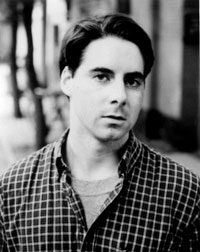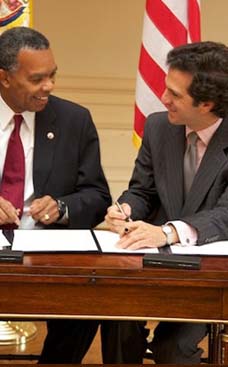
"In China, the transition has been so abrupt that many traffic patterns come directly from pedestrian life -- people drive the way they walk. They like to move in packs, and they tailgate whenever possible. They rarely use turn signals. Instead they rely on automobile body language: if a car edges to the left, you can guess that he's about to make a turn. And they are brilliant at improvising. They convert sidewalks into passing lanes, and they'll approach a roundabout in reverse direction if it seems faster. If they miss an exit on a highway, they simply pull onto the shoulder, shift into reverse, and get it right the second time. . . . When approaching a toll, drivers like to switch lanes at the last possible instant; it's common to see an accident right in front of a booth. Drivers rarely check their rearview mirrors. Windshield wipers are considered a distraction, and so are headlights." Author Peter Hessler served as a Peace Corps Volunteer in China.
Jonathan Yardley reviews Peter Hessler's "A Journey Through China From Farm to Factory"
Book review: Jonathan Yardley reviews "Country Driving: A Journey Through China from Farm to Factory" by Peter Hessler
By Jonathan Yardley
Sunday, February 28, 2010
COUNTRY DRIVING
A Journey Through China from
Farm to Factory
By Peter Hessler
Harper. 438 pp. $27.99
Subtitles should never be taken seriously these days, as book publishers often use them to distort a book's true contents for one reason or another, and "Country Driving" is no exception. It is not "a" journey but several, taken over about seven years beginning in 2001 when Peter Hessler got his Chinese driver's license and set out to explore the country. He had arrived there in 1996 as a Peace Corps volunteer, the subject of his deservedly admired book "River Town" (2001), and in 2000 had become Beijing correspondent for the New Yorker, where some of the material in "Country Driving" originally appeared in briefer form.
So there's a bit of a patchwork pattern to "Country Driving," but never mind. It's an absolutely terrific book, at once highly entertaining (his accounts of the driver's test and of how the Chinese act on the road are often hilarious) and deeply instructive, as he paints a portrait of a country in the midst of change so widespread and profound that it can scarcely be grasped. "The longer I lived in China," Hessler writes, "the more I worried about how people responded to rapid change. This wasn't an issue of modernization, at least not in the absolute sense; I never opposed progress. I understood why people were eager to escape poverty, and I had a deep respect for their willingness to work and adapt. But there were costs when this process happened so fast." And:
ad_icon
Click here!
"In the West, newspaper stories about China tended to focus on the dramatic and the political, and they emphasized the risk of instability, especially the localized protests that often occurred in the countryside. But from what I saw, the nation's greatest turmoil was more personal and internal. Many people were searching; they longed for some kind of religious or philosophical truth, and they wanted a meaningful conversation with others. They had trouble applying past experiences to current challenges. Parents and children occupied different worlds, and marriages were complicated -- rarely did I know a Chinese couple who seemed happy together. It was all but impossible for people to keep their bearings in a country that changed so fast."
That passage comes toward the end of "The Village," the second of the book's three sections. It deals with life in Sancha, a tiny hamlet where Hessler and a friend rented a house in the spring of 2002. Sancha is technically within the city limits of Beijing -- "Beijing wasn't too far away, only a couple of hours by car, but back then it was still unusual for city residents to visit the countryside" -- but it might as well be in another universe, being so primitive and insular. The house that Hessler rented had three rooms, mud floors, electricity and a phone line but no indoor plumbing. It was a welcome retreat from the city's bustle -- if you've never been to Beijing, you don't know the real meaning of "bustle" -- and it turned out to give Hessler an intimate view of how change was altering the lives of the ordinary Chinese who interested him far more than did their political and business leaders.
The one who interested him most in Sancha was a young man named Wei Ziqi, who lived with his wife and their young son. He had gone to Beijing in 1987, after finishing the 10th grade, worked there for nine years but found city life uncongenial and returned to Sancha, "where he acquired the rights to farmland that had been left behind by other migrants." During the years that Hessler spent time there, the auto population of Beijing exploded, and people began exploring the countryside by car. Some of them found their way to Sancha. It occurred to Wei Ziqi to open a modest restaurant serving traditional country food. He called it "An Outpost on the Great Wall," a section of which was nearby, and he made a success of it.
That success brought many rewards, but there was a price. Cao Chunmei, his wife, who did virtually all the cooking, "looked exhausted and Wei Ziqi seemed troubled." He "worried endlessly about money." A year earlier, when his son had been seriously ill, "Wei Ziqi had seemed completely calm. But he had been prepared for that experience: in Sancha, where everybody grew up poor, they know what it means to struggle with sickness and death. Success is the hard part -- as an entrepreneur, Wei Ziqi stepped into uncharted territory."
Hessler became close to Wei Ziqi and his family -- his account of the little boy's illness and his own efforts to help him and his parents is exceptionally moving -- with the result that he got more in Sancha than he had bargained for: "In the beginning I had seen the village as an escape, a place where I could hike and write in peace; but now I went there for different reasons. In China it was the closest I ever came to home." Eventually, "after four years, Sancha felt as familiar as any place I had known during adulthood," and "the longer I stayed in Sancha, the more I appreciated the rhythm of the countryside, the way that life moved through the cycles of the seasons. . . . Progress had arrived: each year led to some new major change, and always there was the sense of time rushing ahead. But the regularity of the seasons helped me keep my bearings."
Hessler's account of his years in Sancha is for me the highlight of "Country Driving," but that in no way diminishes my admiration for the other two sections. In the first, "The Wall," he takes a couple of car trips through places along the routes of various sections of the Great Wall -- in fact it is not a single wall but a mishmash of many, built over the centuries primarily to resist Mongol invaders -- that are rapidly emptying out as people rush from the country to the city. There is much here about the urbanization of China, a phenomenon far more vast and unsettling than most of us in the West understand, but there is also wonderful stuff about Chinese rental cars, speed traps, license-exam questions and the drivers themselves:
"In China, the transition has been so abrupt that many traffic patterns come directly from pedestrian life -- people drive the way they walk. They like to move in packs, and they tailgate whenever possible. They rarely use turn signals. Instead they rely on automobile body language: if a car edges to the left, you can guess that he's about to make a turn. And they are brilliant at improvising. They convert sidewalks into passing lanes, and they'll approach a roundabout in reverse direction if it seems faster. If they miss an exit on a highway, they simply pull onto the shoulder, shift into reverse, and get it right the second time. . . . When approaching a toll, drivers like to switch lanes at the last possible instant; it's common to see an accident right in front of a booth. Drivers rarely check their rearview mirrors. Windshield wipers are considered a distraction, and so are headlights."
There's more about cars and drivers in "The Factory," the third section, as well as more about the complex, difficult transition from country to city. It's about the establishment of a small factory at the city of Lishui in southern Zhejiang Province, and as in the other sections we meet some interesting characters, all of whom Hessler treats with respect and often affection. Hessler clearly came to love China in the more than a decade he spent there, and he was endlessly surprised, amused and delighted by it. He has a highly developed taste for oddness, incongruity and just plain weirdness, all of which he describes with not a scintilla of condescension. "Country Driving" is a wonderful book about China that also happens to be a terrific book about the human race.












